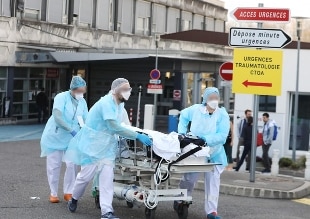Coronavirus: over a million cases in Eastern Europe, infections are also growing in Germany
Coronavirus, infections rise in Europe.
In France, over 10,500 cases in 24 hours
Coronavirus: 27 million cases and 880,000 deaths worldwide.
The alarm in Europe
Share
23 September 2020 In the United Kingdom there is a new significant increase in new cases of Covid 19 in the last 24, with 6,178 new infections, compared to 4,926 yesterday, which bring the total of infections since the beginning of the pandemic to 409,729 cases. These are numbers very close to the record of daily cases, 6,201, recorded on May 1st. Although it must be considered that the number of tampons that are carried out now is more than double those that were carried out last spring. At the moment, the British government claims it has the capacity to carry out 260,000 tests per day.
Today's increase is the third ever recorded since the beginning of the pandemic. Even today there were 37 deaths, leading to a total of 41,862 victims. Currently 1,469 patients are hospitalized in hospitals in the United Kingdom, of which 211 are mechanically ventilated (yesterday there were 181). Nationally, the majority of victims are recorded in England (37,172), 577 in Northern Ireland, 2,508 in Scotland and 1,605 in Wales.
UK
trial Britain will host clinical trials in which volunteers are deliberately infected with the coronavirus to test the effectiveness of potential vaccines. The Financial Times reported that the project, funded by the government, is expected to start in January in a quarantine facility in London: About 2,000 participants have signed up for the program through a US group called 1Day Sooner. The article, which cites the people involved in the project, says that volunteers should first be inoculated with a vaccine and subsequently receive a challenge dose of the coronavirus. The vaccines that would be evaluated in the project are not named, but AstraZeneca, which is developing the vaccine with the University of Oxford, says it is not aware of the initiative.
France, maximum alarm in Paris
New anti-Covid measures in France, in particular in several metropolises including Paris, where the new coronavirus runs impressively. The French Minister of Health, Olivier Véran, will present a new mapping of the epidemic, which will place the various cities in the category "super-red" or "scarlet"; which will prompt a series of new health restrictions. After a Defense Council dedicated to Covid in the morning, Véran will shortly present a new mapping of the circulation of the virus, particularly in large cities, and will specify the different recommended responses based on the categories in which the cities have been placed, including "red "," super red "and" scarlet ".
Spain, Madrid asks for army intervention
The community of Madrid will ask Pedro Sanchez's government tomorrow, in an "extraordinary" meeting of the Covid-19 Group, urgent military support to carry out - among other things - over half a million tests and the disinfestation works in the 37 areas subject to restrictions on mobility and activity, due to the high incidence of infections. Madrid will also ask for other 222 men, including national policemen and the Guardia Civil (who will be entrusted with the task of verifying the quarantines and possibly the task of applying sanctions) as well as 300 non-EU doctors. This was announced in a press conference following the meeting of the Governing Council, the regional vice president, Ignacio Aguado. The Madrid government will ask Pedro Sanchez to urgently reform existing regulations to include 300 non-EU doctors in the Madrid health system: doctors who were hired during the first wave of the pandemic and who cannot now be stabilized due to "state restrictions" .
Scientific Reports: second wave in Europe by January 2021
A second wave of the Covid-19 pandemic could take place in Europe by January 2021. This is what the mathematical models published in Scientific Reports by Giacomo Cacciapaglia of the French Institut de Physique des 2 infinis indicate. of Villeurbanne and by Francesco Sannino of the University of Southern Denmark. The estimate is based both on data relating to infections and on those relating to travel through ten European countries, which do not include Italy.
The model is based on data relating to the first wave, with a 15% variation in infection rates, and indicates that the timing of the second wave may differ from country to country as it will depend on the ability to control the infection through measures of prevention, such as social distancing, outbreak control and border control. The times when the second wave peaks could occur are strongly dependent on infection rates, according to the data considered in the research, collected in Belgium, Bosnia, Croatia, Czechia, Greece, the Netherlands, Serbia, Slovakia, Slovenia and Spain . All of these countries showed the start of a second wave in early August.

